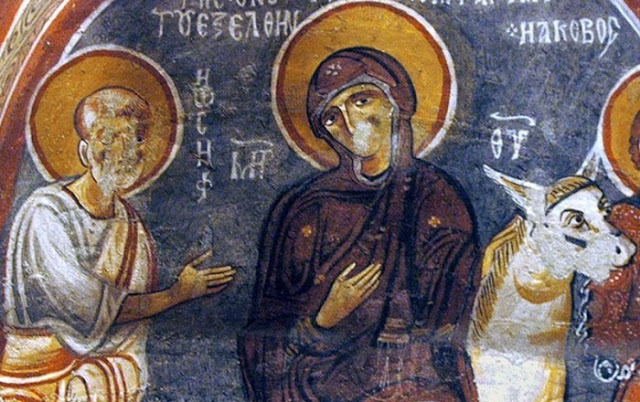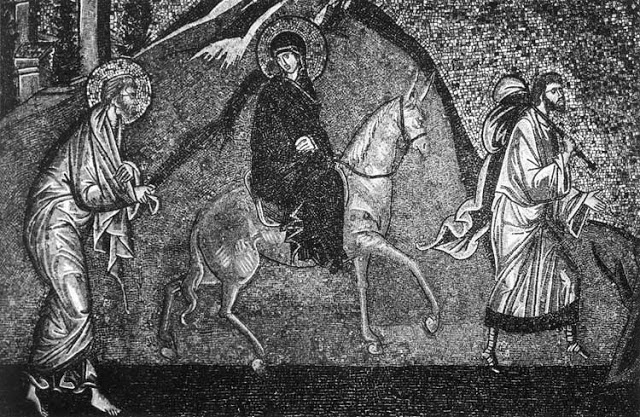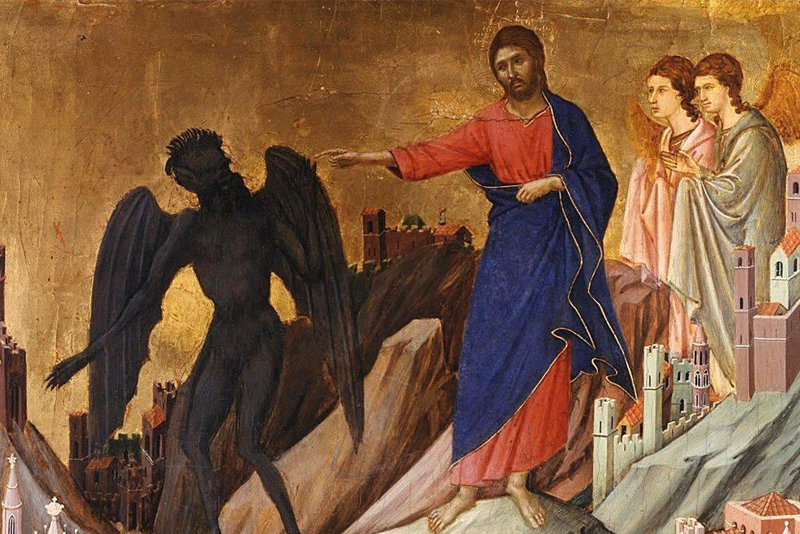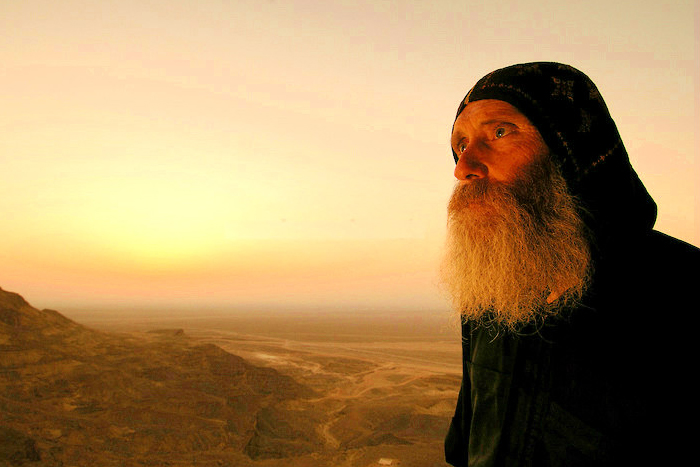But thou, Bethlehem Ephratah, though thou be
little among the thousands of Judah, yet out of thee
shall he come forth unto me that is to be ruler in
Israel; whose goings forth have been from of old,
from everlasting. (Micah 5:2)
There was something strange going on in Palestine 2,000 years ago. Did people realize that they happened to be alive in the greatest days of human history? Did the wind of change blow in the air? What kind of wind was it? Was it a great and strong wind that rent the mountains, and brake in pieces the rocks before the Lord (1 Kings 19:11) or a still small voice (Ibid.) that spoke to Prophet Elijah? God’s chosen people might have had less than perfect understanding of the universal significance of what was going on but they still felt that something was going to change in the godless world after the birth of John, the son of Zacharias.
Unpleasant and scary news was coming out of Rome, the capital city of all the Mediterranean. Emperor Augustus decided to perform a general census to learn how many people there were in the Empire and to be able to tax them properly. Did the Princeps, the emperor of the vast Pax Romana that spread from Gallia to Armenia and from Germany to the sands of the Sahara, know that he was merely a tool in the hands of the inscrutable Divine Providence and that the Lord would use that census to fulfil a prophecy of Prophet Micah who had lived 700 years prior to these events? Could he ever know that a carpenter from Nazareth would soon establish a New Eternal Kingdom, which is not of this world?
Virgin Mary and her betrothed husband Joseph, who was of Davidic descent, lived in the town of Nazareth in Galilee. When the Caesar’s decree on census was announced, everyone
was to return to their native towns and villages to submit their names to census lists according to their tribal affiliation. Joseph belonged to the ribe of Judah and the House of David, so he had to take the pregnant Virgin Mary with him on the difficult and dangerous journey from Nazareth through Samaria, which was hostile towards the Jews, the noisy Jerusalem, and get to Bethlehem where his ancestors had lived.
That righteous man had to face so many troubles and worries! He endured so much on their road to Bethlehem! Perhaps, he compared his trip to Bethlehem to the Exodus of Jews from Egypt. The Jews escaped slave labor in Egypt and went to the Promised Land, flowing with milk and honey—the land where they could finally find peace and freedom.
If we read the Holy Scripture with love and attention, we may find similarities between the great Exodus of the Israelites from Egypt and the journey of the Holy Family from Nazareth to Bethlehem, the hometown of the great King David. Let’s appreciate the beauty, depth, and immense breadth of the Scripture.
Israel was an Old Testament family that left the pagan Egypt and went into the Promised Land, led by Prophet Moses. The Holy Family of the New Testament, which was the seed of the new Christian nation, led by the Righteous Joseph, leaves the pagan land of Galilee (at least, that was how Prophet Isaiah had called it) and went through an unfriendly land to Bethlehem, which was a sacred place for every Jew. The ancient Israelites entered the Promised Land with the Ark of the Covenant, and the cloud of God’s glory covered the tabernacle, namely, the tent of the testimony: and at even there was upon the tabernacle as it were the appearance of fire, until the morning (Cf. Numbers 9:15). This time, Virgin Mary was the living Ark of the Covenant carefully guarded by Saint Joseph, and they were protected and guided by the Eternal Word of God who had previously led the Jews out of Egypt and remained in the womb of the Most Holy Ever-Virgin for nine months. The Jews entered the land, which was flowing with milk and honey, but the local tribes didn’t want to receive the alien people in their lands; likewise, Mary, Joseph, and Baby Jesus could not find room for them in the inn (Luke 2:7), because people who had come for the census before them occupied all rooms in the local inns. Ancient Jews and the Most Pure Virgin with the Noble Joseph had to fulfil God’s will and go through all hardships that they’d meet on their way in order to make the Divine Plan of our salvation come true.
That was how God, willing to save every person who comes into this world, was guiding and teaching the Israeli people to be patient in spite of many sorrows that befell them so that they could finally be able to give God the greatest level of holiness that human race is capable of: that of the Most Pure Theotokos and Ever-Virgin Mary. Her humility and obedience will be greater than that of all greatest prophets. She will become a Temple that is more magnificent than the Temple of Solomon.
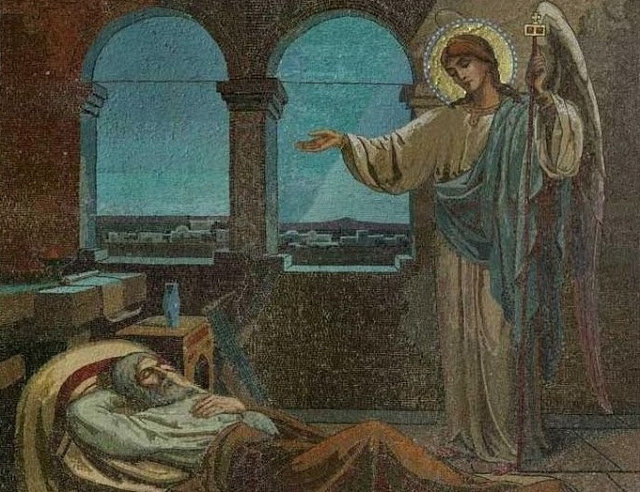
What does the Lord want to tell us with this passage? The Lord calls us to get on the road leading towards holiness and salvation. We must get out of Egypt and stop being the devil’s slaves; we must leave the worldly sea of Nazareth and walk to Bethlehem, to the Promised Land, overcoming all external and internal hardships by humility and faith, and take our families along. Bethlehem means “House of Bread” in Hebrew (בית לחם). It was here in this House of Bread that the Bread of Life that descends from the Heaven was to be born, according to Micah’s prophecy. The Lord says, I am that bread of life. Your fathers did eat manna in the wilderness, and are dead. This is the bread which cometh down from heaven, that a man may eat thereof, and not die. I am the living bread which came down from heaven: if any man eat of this bread, he shall live for ever: and the bread that I will give is my flesh, which I will give for the life of the world. (John 6:48-51). Let us hearken to the Savior’s call and go to Bethlehem, to the Lord’s Church—that real House of Bread where all who thirst and hunger after righteousness can receive that Bread, which is always eaten but never consumed, the bread that sanctifies those who partake of it.
 By John Nichiporuk,
By John Nichiporuk,
a Bachelor of Theology,
specialized in Biblical Studies.
The Catalog Of Good Deeds, 2018
